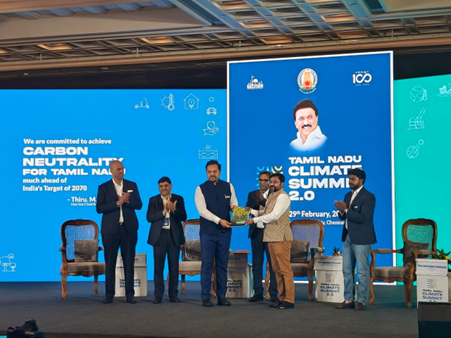Shubhashis Dey, Director, Climate Policy and Climate Finance, Shakti Sustainable Energy Foundation had the honour of releasing a report on “Baseline study on Rehabilitation of Coastal Habitats for climate change adaptation through eco–friendly solutions” prepared by National Centre for Coastal Research for Department of Environment and Climate Change, Government of Tamil Nadu during ‘Tamil Nadu Climate Summit 2.0’ on February 29, 2024, in Chennai, Tamil Nadu.

The summit served as a vital platform for stakeholders from various sectors to collaborate and strategise on addressing the critical challenge of climate change. This report offers a comprehensive overview of the summit’s key themes, discussions, and takeaways.
The Summit was divided into two phases:
Day 1 of the summit focused on exchanging knowledge and laying the groundwork for action. Initiatives like the Tamil Nadu Fish Net Initiative and microforest creation were discussed, alongside strategies for green indexing of cities and industries, and e-waste management. The launch of Tamil Nadu’s greenhouse gas inventory highlighted an 84% increase in emissions from 2005 to 2019, guiding efforts towards net-zero emissions by 2070. Additionally, a baseline study on the Climate Literacy Model was presented.
Day 2 centered on accelerating action and forming partnerships. Discussions included promoting sustainable food systems by emphasising local consumption, transitioning to renewable energy sources like solar and wind power, navigating carbon credit policies and climate finance, and harnessing the circular economy to reduce waste and achieve carbon neutrality in cities.
The Tamil Nadu Climate Summit 2.0 demonstrated the state’s steadfast dedication to combatting climate change and fostering sustainability. Its outcomes highlight a commitment to significant emission reductions, aiming for 24% by 2030 and 50% by 2050, alongside a roadmap for achieving net-zero emissions by 2070 through renewable energy, sustainable land management, and collaboration with partners. ProClime’s $60 million pledge underscores the importance of carbon projects in mitigating emissions and advancing climate goals, emphasising the role of international cooperation in addressing this global challenge.
